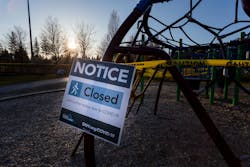Some months it’s difficult to decide what to write about for my editorial. There are either too many topics to choose from, or else nothing really jumps out at me (those are the worst). And then there are months like this one, where events have taken the choice out of my hands. To write about anything besides the ongoing pandemic would be ignoring the elephant in the room.
For me, the striking thing about the coronavirus/COVID-19 crisis is how quickly and profoundly it has changed the way we in this country live and work. Only a month ago it was just this thing on the news. Something to pay attention to, sure, but it was happening to these other people in countries far away. Besides, we’d all heard about Ebola—about MERS, SARS, Zika and other horrible diseases—but they never made it here, were never things we had to factor into our daily lives.
And then enough people with the right degrees ran the numbers, looked at “the curve,” calculated the number of probable serious cases vs. the number of hospital beds—the number of ventilators, ER nurses, surgical masks—and realized we were looking at tens of thousands, possibly hundreds of thousands of American citizens dying. And it took those people with degrees time, but eventually they convinced enough elected officials how serious it would get and they in turn closed, well, just about everything.
I guess I always knew that if there was some sort of public health crisis the government could shut down the theaters, hotels and restaurants—but it’s still amazing to see it happening. They canceled the hockey and basketball seasons. They canceled baseball’s opening day (a day I’ve discovered to be oddly sacred to many of my close friends).
The only real comparison I can make to the times we’re now living in are those days right after the September 11th attacks. Just like then, everything on the news seems to be all the same thing all the time. There’s that same worry about what tomorrow may bring. That same feeling of being in a historical moment. And along with it this sense of us all being in it together, coping together; a kind of civic-mindedness that makes you very aware of yourself—oddly proud of yourself—as a citizen.
But the big difference between then and now is how everyone is participating. Back then the government, the military and first responders were the ones who carried the weight and the rest of us, after doing what little we could (giving blood, donating money) had to somehow get back to our lives.
This time everyone has their part to play, even if it’s just staying at home. Obviously, the health care professionals are the ones on the front lines, but the plumbing industry is not too far behind them. As I write this, the full supply chain of the plumbing and mechanical industry has been designated “Essential Critical Infrastructure Workforce.”
“Essential” does not mean “unaffected.” There are plumbing techs who need to stay home with their kids or care for sick family members or have their own health concerns. More and more contractors are practicing social distancing—even on the job site—and investing in new protocols, new PPE, even offering customers help over the phone or via video conferencing. And the economic slowdown caused by the pandemic is going to affect everyone’s business.
But everyone will still need clean, hot water. This industry is going to be just fine. This country is going to recover. In the meanwhile, we need to keep informed, stay safe, and look out for one another—which is probably good advice whether you’re in a pandemic or not.
About the Author
Steve Spaulding
Editor-in-Chief - CONTRACTOR
Steve Spaulding is Editor-in-Chief for CONTRACTOR Magazine. He has been with the magazine since 1996, and has contributed to Radiant Living, NATE Magazine, and other Endeavor Media properties.
